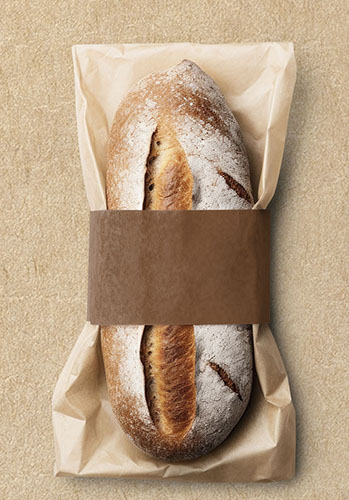
By Fedima
Sustainable packaging in the bakery sector lies at
the intersection between EU regulations and industry commitments.
In the food sector, packaging has both environmental and food safety implications. Fedima, as the voice of European manufacturers and suppliers of ingredients to the bakery and pastry industries, has identified sustainable packaging as one of the key priorities for a sector that strives to transition to greener practices.
The environmental challenges posed by the growing proliferation of plastics and their hazardous presence in nature are among the main reasons that prompted the European Union to intervene with rules to reverse this trend. The year 2024 has been pivotal in the EU packaging regulatory landscape, with the shift from the EU Packaging Directive to the new Packaging and Packaging Waste Regulation (PPWR). The Regulation introduces stricter, more comprehensive requirements for all businesses, including food businesses, and targets the reduction of unnecessary packaging, the increase of recyclability, and the minimization of single-use plastics.
Fedima’s Sustainability Committee, with its ad-hoc Packaging Taskforce, has made significant efforts to help its members welcome this regulatory scenario and shift to more sustainable packaging. Bakery ingredient manufacturers have already made progress in this transition process. Several Fedima members have been improving their recyclability rates in recent years, a sign of the sector’s eagerness to keep up with EU expectations.
Defining sustainability strategies
However, to best accompany bakery ingredient manufacturers in this process, Fedima advocates for a realistic approach: setting achievable targets and providing incentives to support sustainable practices throughout the industry are key prerogatives in these times of change.
In fact, reaching fully sustainable packaging comes with its share of challenges. For example, varying infrastructures for waste management across EU Member States hinder the uniform application of sustainability practices: in some European countries, advanced systems for waste collection and recycling are already established, while others lack the essential infrastructure.
requirements included in the Regulation needs to be further developed, as they are crucial to ensure a unified and effective approach to recyclability.“
Fedima
It is also crucial to make sure that the body of legislation on packaging sustainability is balanced, carefully integrating environmental goals with the need to maintain food safety. For this reason, Fedima supports the goals of the new PPWR and particularly welcomes those provisions that exempt certain types of flexible packaging in direct contact with food from broad reuse requirements. While promoting the recyclability and reusability of packaging, food and consumer safety must remain a top priority.
Sustainable packaging and EUDR
The EU Deforestation Regulation (EUDR) adds another layer to the sustainability framework for packaging. Fedima supports the Regulation’s aim of fostering sustainable, deforestation-free supply chains but stresses the need for a balanced approach to avoid excessive burdens on businesses. With the European Commission’s proposed delayed application date, and the provisional agreement reached by the Council and the European Parliament, the baking industry will focus on continuing preparations, building on the existing guidelines from Brussels. However, further direction and support from the Commission will be needed over the next year, to ensure effective collaboration towards increasingly sustainable value chains.
Achieving sustainable packaging goals in the bakery sector will require the continued development of harmonized rules and effective traceability tools to track progress toward recyclability and reuse targets. Investments in new technologies and consumer incentives will be essential, particularly in European countries lacking adequate infrastructures and regulation, together with support from the European Commission in ensuring that businesses are fully prepared by the time the PPWR takes full effect. Additionally, the harmonization of recyclability labeling requirements included in the Regulation needs to be further developed, as they are crucial to ensure a unified and effective approach to recyclability.
Lastly, for our industry to reach good sustainable packaging results that are in line with the EU’s expectations, the entire bakery value chain needs to be activated. Sustainable packaging efforts need to take the front stage in all directions: upstream, among raw materials providers and packaging manufacturers, and downstream, among retailers and consumers. Regardless of which point of the supply chain we look at, the responsibility must be shared across all actors to reach key objectives: implement circular packaging systems, reduce overall waste, and promote environmentally friendly practices.
Looking forward, Fedima will continue to closely monitor relevant legislative developments and support its members in joining the sector’s sustainability commitments, to enhance industry-wide collaboration, and support continuous progress towards sustainable packaging.
Through collaborative efforts, transparent guidelines, and balanced legislation, the bakery ingredients industry can make significant strides in reducing waste and fostering a circular economy that benefits both consumers and the environment.
Fedima calls on EU policymakers to:
+ Avoid regulatory overlaps and support the EU’s Design for Recycling criteria by 2030.
+ Develop an EU-harmonized labelling system to not only prevent market fragmentation, but also help consumers correctly sort their waste, simplifying choices and forming an integral part of waste management systems across all EU Member States.
+ Recognize the value of circularity in packaging while maintaining food safety and hygiene standards as a top priority.
Fedima supports the transition to a circular economy at EU level by:
+ Advocating for increased availability of waste collection, sorting, and recycling infrastructure at local level, alongside greater investment in collection and recycling systems.
+ Encouraging its members to adopt packaging reduction measures and achieve recyclability targets, while remaining committed to helping members enhance their data tracking capabilities.
+ Tracking its members progress toward achieving environmentally sustainable packaging.


